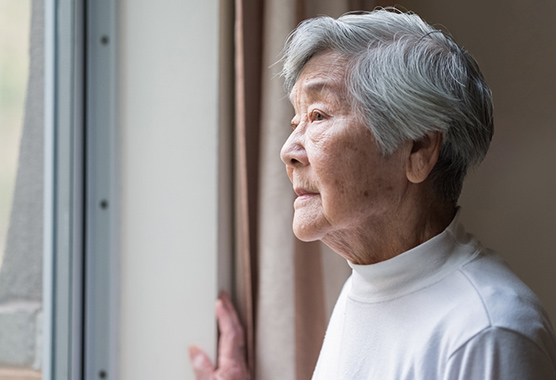Stroke
A stroke can be a life-changing condition. We’re here to give you the most advanced treatments and compassionate support.
Medically reviewed by Kwan Ng, M.D. on Aug. 12, 2025.

Specialized Stroke Care
Strokes are a leading cause of disability. Our vascular specialists provide complete care for stroke and all types of vascular disease.
What Is a Stroke?
A stroke happens when there is a blockage or bleeding in your brain. Blood clots typically cause the blockage, which leads to an ischemic stroke. A temporary clot in your brain may cause a transient ischemic attack (TIA). Bleeding in your brain may lead to a hemorrhagic stroke.
A stroke is a medical emergency because the lack of blood flow can begin to damage your brain cells rapidly. The more quickly you get treatment, the lower the risk of brain damage.
Damage to brain cells affects the way your brain works and controls your body functions. A stroke can affect your ability to do things such as:
- Eat, drink and swallow.
- Control your bladder and bowels.
- Move or speak.
- Think and remember clearly.
Stroke Symptoms
A stroke is a medical emergency. The sooner you get treatment, the lower the risk of serious brain damage and disability.
Common Symptoms
A stroke may cause one or more symptoms, including:
- Blurred or double vision
- Memory loss
- Dizziness
- Headache that comes on suddenly
- Losing of muscle control on one side of your face
- Numbness, weakness or loss of sensation, usually on one side of your body
- Difficulty speaking, such as slurring your words, or trouble understanding others
Think BE FAST
The acronym BE FAST is a way to remember the warning signs of a stroke.
- B: Balance. Be aware of sudden balance problems.
- E: Eyes. Watch for sudden loss of or change in vision.
- F: Face. Drooping on one or both sides of your face is a warning sign.
- A: Arms. If you try to raise your arms and one arm sags or drops, this may be a sign of a stroke.
- S: Speech. A stroke often affects your ability to speak clearly or find the right word.
- T: Time. It’s critical to get help as quickly as possible. Take note of when symptoms began.
Causes of Stroke
Some of the causes of hemorrhagic strokes and ischemic strokes are different, but there is some overlap.
Blood Clot
Clots due to atherosclerosis, atrial fibrillation, clotting disorders, heart defects and other conditions can cause an ischemic stroke.
Brain Aneurysm
An aneurysm is a bulge in a weak blood vessel in your brain. If the vessel breaks, it leads to bleeding, which may cause a hemorrhagic stroke.
High Blood Pressure
Having high blood pressure can weaken blood vessels and cause a hemorrhagic stroke. High blood pressure can also play a part in ischemic strokes.
Stroke Risk Factors
Certain factors can raise your risk of a stroke.
Alcohol
Overuse of alcohol increases your stroke risk.
High Cholesterol
High cholesterol can contribute to plaque buildup in your blood vessels, increasing your risk of ischemic stroke.
Migraine Headaches
People who have migraines, especially with auras, have a higher risk of stroke.
Tobacco Use
Your stroke risk is higher if you smoke cigarettes, use smokeless tobacco or vape tobacco.
Type 2 Diabetes
High blood sugar can damage your blood vessels, which increases your stroke risk.
Stroke Diagnosis and Testing
Your provider will perform a neurological exam to look for signs of stroke. This involves doing certain tasks and movements and answering questions.
You also may need:
- Blood tests to check your blood sugar, organ function and markers of possible heart problems.
- Electrocardiogram (EKG), which looks at your heart’s electrical activity, to rule out a heart problem. Some heart conditions may cause symptoms that look like signs of a stroke.
- Imaging tests, such as CT scan or MRI, to look for clots or changes in blood flow. Our neuroimaging center uses the most advanced equipment and techniques available to get detailed information quickly about blood flow in your brain.
Stroke Treatments at UC Davis Health
Different types of strokes require different treatments. It’s vital to get treatment as quickly as possible.
The UC Davis Medical Center Stroke Program provides the most advanced emergency and ongoing care for stroke. We offer leading-edge therapies, intensive monitoring and rehabilitation and support services. We have a dedicated ward staffed by teams of nurses, physicians and therapists specializing in stroke care.
Blood Pressure Management
With hemorrhagic stroke, it’s important to lower blood pressure right away using medications. Later, you’ll need to keep your blood pressure in a healthy range.
Medication
Medications depend on the type of stroke and how severe it is. For ischemic stroke, you may get a drug that dissolves the clot that caused the stroke.
Surgery
You may need surgery to remove a clot in your brain that isn’t responding to medication. For hemorrhagic stroke, you may need surgery to reduce pressure in your skull or stop bleeding.
Rehabilitation for Recovery
A stroke often affects your body’s ability to move and function. Our compassionate rehabilitation specialists are dedicated to helping people recover from a stroke.
Preventing Stroke
Strokes are not always preventable, but you can take steps to lower your risk.
Make Healthy Changes
To lower your risk, limit alcohol use, eat healthy foods, get regular physical activity and stay at a healthy weight. Work with your provider to create a quit plan if you use tobacco.
Manage Health Conditions
It’s important to manage atrial fibrillation, high blood pressure, high cholesterol, type 2 diabetes and other conditions that affect stroke risk.
Take Medications as Prescribed
Take all of your medications as directed by your provider. Certain drugs, such as blood pressure and cholesterol medication, can lower your risk of stroke.
Ischemic strokes account for
87%Of all strokes in the U.S.
Every year
795KPeople in the U.S. have a stroke
Source: Centers for Disease Control and Prevention (CDC): Stroke Facts
Request an Appointment
As Sacramento's No. 1 hospital, you'll benefit from unique advantages in primary care and specialty care. This includes prevention, diagnosis and treatment options from experts in 150 specialties.
Referring Physicians
To refer a patient, submit an electronic referral form or call.
800-4-UCDAVIS
Patients
Call to make an appointment.
Consumer Resource Center
800-2-UCDAVIS

Ranked among the nation’s best hospitals
A U.S. News & World Report best hospital in cardiology, heart & vascular surgery, diabetes & endocrinology, ENT, geriatrics, neurology & neurosurgery, and pulmonology & lung surgery.

Ranked among the nation’s best children’s hospitals
U.S. News & World Report ranked UC Davis Children’s Hospital among the best in pediatric nephrology, orthopedics*, and pulmonology & lung surgery. (*Together with Shriners Children’s Northern California)

Ranked Sacramento’s #1 hospital
Ranked Sacramento’s #1 hospital by U.S. News, and high-performing in aortic valve surgery, back surgery (spinal fusion), COPD, colon cancer surgery, diabetes, gynecological cancer surgery, heart arrhythmia, heart failure, kidney failure, leukemia, lymphoma & myeloma, lung cancer surgery, pacemaker implantation, pneumonia, prostate cancer surgery, stroke, TAVR, cancer, orthopedics, gastroenterology & GI surgery, and urology.

The nation’s highest nursing honor
UC Davis Medical Center has received Magnet® recognition, the nation’s highest honor for nursing excellence.

World-class cancer care
One of ~59 U.S. cancer centers designated “comprehensive” by the National Cancer Institute.

A leader in health care equality
For the 13th consecutive year, UC Davis Medical Center has been recognized as an LGBTQ+ Healthcare Equality Leader by the educational arm of America’s largest civil rights organization.

